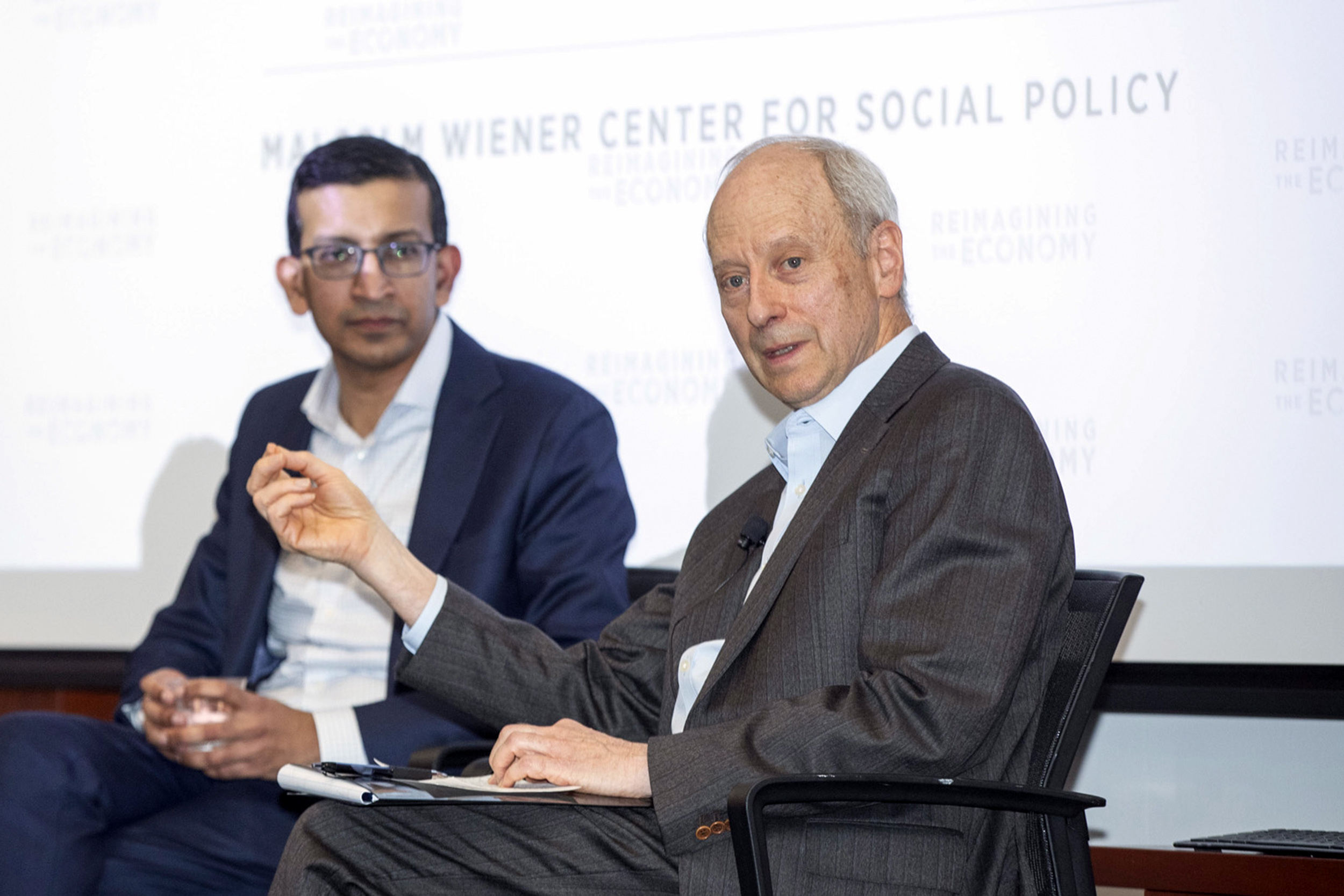Chetty, Sandel on what’s crushing American Dream

Raj Chetty (from left) and Michael Sandel spoke at the Kennedy School Wednesday as part of the Reimagining the Economy program.
Kris Snibbe/Harvard Staff Photographer
Drop in economic mobility, myth of meritocracy driving disillusionment: ‘It’s no longer easy to get ahead, even through hard work’
When you look at big data, it’s irrefutable: The American Dream is fading.
Raj Chetty, the William A. Ackman Professor of Economics, said as much during Wednesday’s “Education, Elitism, and Economic Opportunity” event at the Kennedy School, which also featured political philosopher Michael Sandel, the Anne T. and Robert M. Bass Professor of Government.
From the 1940s to the 1980s, Chetty said, economic mobility dipped dramatically. In the 1940s, it was virtually guaranteed that Americans would climb the economic ladder, with more than 90 percent earning more than their parents. But for those born in the 1980s, who are in their 30s now? They’ve got a 50/50 shot at achieving similar levels of financial success.
“It reflects a fundamental change in the economy that we would like to understand,” Chetty said. “These kinds of changes in our economy have led a lot of people to express frustration about this being a country where it’s no longer easy to get ahead, even through hard work.”
Chetty is the director of Opportunity Insights, an organization that uses granular data to zoom in on and understand the roots of economic inequality. During the event, Chetty highlighted research the team published in July, which included an analysis of admissions data for “Ivy-plus” colleges — Ivy League colleges plus Chicago, Duke, Stanford, and MIT — to see how it related to the socioeconomic diversity of America’s leadership.
What they found is that children from families in the top 1 percent are twice as likely to attend Ivy-plus colleges as those from middle-class families with comparable SAT/ACT scores. This matters, because while only 0.8 percent of college graduates attend Ivy-plus colleges, they play an outsized role in leadership positions: 41.7 percent of U.S. presidents and 71.4 percent of Supreme Court justices attended these institutions, said Chetty.
Sandel pointed to some of Chetty’s earlier research that highlighted how a college education doesn’t guarantee upward mobility, especially for low-income students. He said this research served as “an astounding corrective to the complacent assumption that many people have that higher education is a powerful [driver] of upward mobility.”
“Why is there such a frenzied competition to get into top colleges and universities?” Sandel said. “We have cast higher education — colleges and universities like this one — as arbiters of opportunity … But should it be that way?”
The event, organized by the Malcolm Wiener Center for Social Policy, was part of the Reimagining the Economy project, which takes a multidisciplinary approach to understanding, interpreting, and addressing the range of economic crises in the world today. The project’s co-director Dani Rodrik, also the Ford Foundation Professor of International Political Economy, moderated the event.
Throughout the conversation, Chetty and Sandel exchanged perspectives on some of the drivers of economic inequity and the disillusionment of many Americans. Sandel pointed out that while it’s important to focus on the financial success of those who attend college, it’s also important to acknowledge that most Americans do not.
In many ways, attitudes toward success have pitted college-educated individuals against the working class, creating an illusion of “winners and losers” that roils our politics, Sandel said. The myth allows financially successful individuals to claim that the U.S. is a meritocratic society, while those with less upward mobility — even though they work hard — are stuck in “five decades of stagnant wages.” It creates tension.
“[There’s a] tendency of those on top to believe that their success is their own doing, a measure of their own merit. And by implication, that those who struggle, those left behind, must deserve their fate too,” Sandel said. “The work that a great many working people do is not valued, honored, or recognized by the wider society.”
Chetty agreed that beyond the numbers, it’s important to acknowledge the social factors at play when it comes to attitudes around economic mobility. For many, work is an important part of one’s life and identity. Research should help inform policies that consider concerns beyond wages that would help Americans achieve upward mobility in a meaningful way. This includes figuring out how to measure and elevate factors such as dignity, social status, and social connections, which are much harder to measure.
Chetty encouraged those in attendance to think creatively about how to explore these elements in future research.
“[These] are very interesting and important issues that may come up,” he said. “[Addressing them] would help us create a new generation of economics.”




